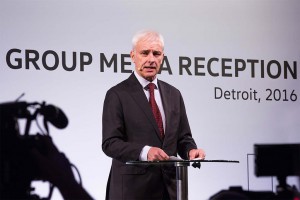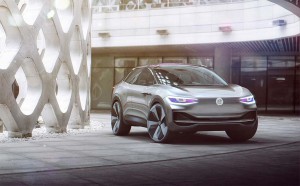Volkswagen executives had a lot to say about their plans to bring electric and high-efficiency gas vehicles to market over the next decade, during the German automaker’s annual shareholders meeting – but they were largely mum when it came to the specifics of an extensive internal probe into the company’s cheating on diesel emissions standards.
“The future is electric,” declared Volkswagen Group CEO Matthias Mueller, during the annual meeting in Hanover, not far from the automaker’s headquarters in Wolfsburg. And VW, he added, “intend(s) to be the number one in e-mobility by 2025.
The German automaker plans to bring out 10 electrified models by 2018, and have 30 more battery-electric models in its product portfolio by 2025, said Mueller, expanding on VW’s earlier commitment to the technology. All 12 of the company’s brands are expected to add some electrified models.
(VW unveils I.D. Crozz battery-SUV at Shanghai Motor Show. Click Here to check it out.)
Mueller noted that Volkswagen has spent 3 billion euros on alternative powertrain technologies over the last five years, and he said the plan is to triple that investment over the next five.
Despite that effort, VW isn’t walking away from the internal combustion engine, however. By 2020, VW plans to boost the efficiency of its fossil fuel-based engines by 10 to 15%, shareholders were told.
That includes both gasoline and diesel products, Mueller stressing that despite its emissions scandal, “diesel will remain indispensable for the foreseeable future.” (Though the VW brand no longer plans to offer diesels in the U.S. market.)
(VW offers big deals on fixed diesel leftovers. Click Here for the story.)
The automaker has so far spent almost $30 billion as a result of the revelation that it has used a so-called “defeat device” to cheat on U.S. emissions tests of its 2.0- and 3.0-liter turbodiesels. That includes both civil and criminal penalties, a buyback program covering as many as 500,000 diesel vehicles sold in the U.S., a payout to American dealers and other costs.
It is still negotiating with investors who claim that the scandal adversely affected the value of their holdings. (And former CEO Martin Winterkorn is under criminal investigation by German prosecutors looking to see if he and other VW officials illegally covered up information about the diesel engine rigging.)
Shortly after acknowledging that it had cheated on emissions tests, VW launched an internal probe into the rigging, headed by U.S. law firm Jones Day. While various leaks have given insight into the roots of the scandal, the automaker has not revealed the probe’s findings, something investment advisory firm Hermes EOS said this week the make should do as part of its effort to close the book on the crisis.
Apparently, however, that isn’t going to happen, VW Chairman Hans Dieter Poetsch telling investors at the Wednesday meeting, “There is no written concluding report by Jones Day and there will not be one.”
The VW official asked investors “for your understanding that VW for legal reasons is prevented from publishing such a final report.”

Diesels will remain essential to the VW Group - but only 1 Audi diesel model will remain in the U.S. market.
It’s likely to take more time for VW to put the scandal completely behind. Along with the ongoing criminal probe in Germany, U.S. prosecutors have charged seven current and former company employees for their alleged role in rigging the diesel engines. One pleaded guilty last year while another will go to court in early 2018. Five others remain in Germany which does not have an extradition treaty covering such allegations.
Mueller, Poetsch and other Volkswagen executives have been struggling to rebuild the automaker’s once-lofty image, and the CEO put a positive spin on the fact that Larry Thompson, a former U.S. deputy attorney general, has been appointed to the post of outside monitor for the next three years.
“I see this as an opportunity,” said Mueller, adding that, “The work of the monitor can and will contribute to bringing risk management, compliance and integrity within the group to new levels.”
For his part, Mueller has been trying to position Volkswagen as a more “agile and courageous, more entrepreneurial and pragmatic” company, and one that, he told investors is shifting away from being just an automaker, “into a globally leading mobility provider.”
Along with the increased emphasis on alternative powertrain systems, VW is looking at a variety of other technologies, including connected car and autonomous vehicles. It is also partnering with car- and ride-sharing services, such as Israeli-based Gett.
“Our industry will see more fundamental changes in the coming decade than we have experienced over the past 100 years,” said Mueller, adding that it is critical for VW to stake out a leadership position for the transformation.
(Sales on the rebound, VW delivers big surge in Q1 earnings. Click Here for the story.)


